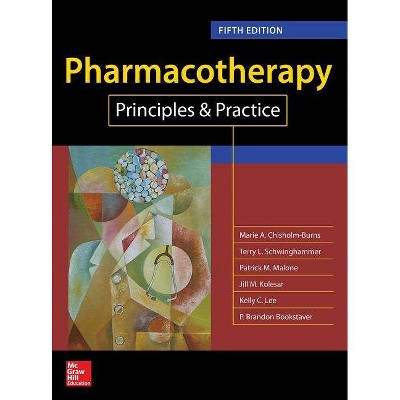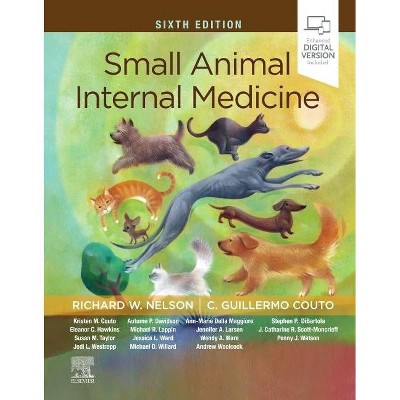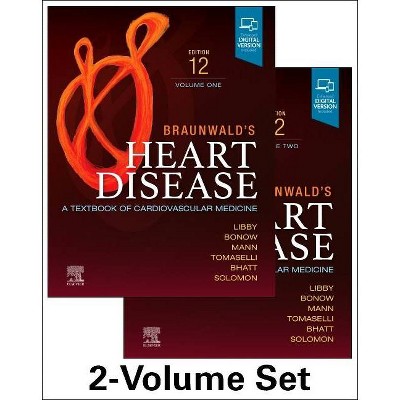Harrison's Principles of Internal Medicine, Twentieth Edition (Vol.1 & Vol.2) - 20th Edition (Hardcover)
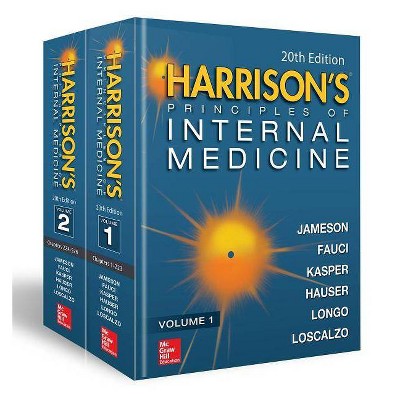
Similar Products
Products of same category from the store
AllProduct info
<p/><br></br><p><b> About the Book </b></p></br></br>"Harrison's is intended for learners throughout their careers. For students, Part 1, Chapter 1 begins with an overview of "The Practice of Medicine." In this introductory chapter, the editors continue the tradition of orienting clinicians to the science and the art of medicine, emphasizing the values of our profession while incorporating new advances in technology, science, and clinical care. Part 2, "Cardinal Manifestations and Presentation of Diseases" is a signature feature of Harrison's. These chapters eloquently describe how patients present with common clinical conditions, such as headache, fever, cough, palpitations, or anemia, and provide an overview of typical symptoms, physical findings, and differential diagnosis. Mastery of these topics prepares students for subsequent chapters on specific diseases they will encounter in courses on pathophysiology and in clinical clerkships"--<p/><br></br><p><b> Book Synopsis </b></p></br></br><p></p><p><b>Publisher's Note: </b><b>Products purchased from Third Party sellers are not guaranteed by the publisher for quality, authenticity, or access to any online entitlements included with the product.</b></p><p></p><p></p><b><i>MASTER MODERN MEDICINE!</i></b><p></p><p><b>Introducing the Landmark Twentieth Edition of the Global Icon of Internal Medicine</b></p><p><b>The definitive guide to internal medicine is more essential than ever with the latest in disease mechanisms, updated clinical trial results and recommended guidelines, state-of-the art radiographic images, therapeutic approaches and specific treatments, hundreds of demonstrative full-color drawings, and practical clinical decision trees and algorithms</b></p><p><b><i>A Doody's Core Title for 2020!</i></b></p><p></p><p></p><p>Recognized by healthcare professionals worldwide as the leading authority on applied pathophysiology and clinical medicine, <i>Harrison's Principles of Internal Medicine</i> gives you the informational foundation you need to provide the best patient care possible.</p><p><b><i>Essential for practice and education, the landmark 20th Edition features: </i></b></p><ul><li><b>Thoroughly revised content</b>--covering the many new breakthroughs and advances in clinical medicine that have occurred since the last edition of <i>Harrison's</i>. Chapters on acute and chronic hepatitis, management of diabetes, immune-based therapies in cancer, multiple sclerosis, cardiovascular disease, HIV, and many more, deliver the very latest information on disease mechanisms, diagnostic options, and the specific treatment guidance you need to provide optimal patient care.</li><li><b>State-of-the-art coverage of disease mechanisms: </b> <i>Harrison's</i> focuses on pathophysiology with rigor, and with the goal of linking disease mechanisms to treatments. Improved understanding of how diseases develop and progress not only promotes better decision-making and higher value care, but also makes for fascinating reading and improved retention. <i>Harrison's</i> summarizes important new basic science developments, such as the role of mitochondria in programmed and necrotic cell death, the immune system's role in cancer development and treatment, the impact of telomere shortening in the aging and disease processes, and the role of the microbiome in health and disease. Understanding the role of inflammation in cardiovascular disease, the precise mechanisms of immune deficiency in HIV/AIDS, prions and misfolded proteins in neurodegenerative diseases, and obesity as a predisposition to diabetes are just a few examples of how this edition provides essential pathophysiology information for health professionals.</li><li><b>All-new sections covering a wide range of new and emerging areas of vital interest to all healthcare professionals.</b> New sections include: Sex and Gender-based Issues in Medicine; Obesity, Diabetes Mellitus, and Metabolic Syndrome; and Consultative Medicine-- Plus, a new Part covering cutting-edge topics in research and clinical medicine includes great new chapters on the role of Epigenetics in Health and Disease, Behavioral Strategies to Improve Health, Genomics and Infectious Diseases, Emerging Neuro-Therapeutic Technologies, and Telomere Function in Health and Disease, and Network System Medicine.</li><li><b>Important and timely new chapters</b>--such as Promoting Good Health, LGBT Health, Systems of Healthcare, Approach to Medical Consultation, Pharmacogenomics, Antimicrobial Resistance, Worldwide Changes in Patterns of Infectious Diseases, Neuromyelitis Optica, and more--offer the very latest, definitive perspectives on must-know topics in medical education and practice. </li><li><b>Updated clinical guidelines, expert opinions, and treatment approaches from renowned editors and authors</b> contribute to the accuracy and immediacy of the text material and present a clear blueprint for optimizing patien</li></ul><p/><br></br><p><b> From the Back Cover </b></p></br></br><b>5 STAR REVIEW FROM DOODY'S </b><br><i><b>"This is a book for all students of medicine no matter their level of experience."</b></i><br><b><i>"...the leading comprehensive authority in internal medicine."</i></b><br><b>Reviewer</b>Vincent Carr, DO, MSA, FACC, FACP (Uniformed Services University of the Health Sciences)<br><b>Description</b>For internal medicine specialists, <i> Harrison's </i>has been the go-to reference on the current understanding of pathophysiology for decades. This 20th edition updates the 19th edition published in 2012.<br><b>Purpose</b>The purpose remains the same: to provide a comprehensive, up-to-date reference for learners throughout their careers, from medical students through experienced attending physicians and consultants.<br><b>Audience</b>This is a book for all students of medicine no matter their level of experience. The authors have brought together the most knowledgeable and experienced experts to review the latest updates from the journal literature to provide a foundation for the practice of medicine.<br><b>Features</b>The book is divided into 20 parts that cover broad topics such as the profession of medicine, cardinal manifestations and presentation of disease, oncology and hematology, immune-mediated, inflammatory, and rheumatological diseases, and disorders associated with environmental exposures. The parts are further divided into specific topic sections, such as pain, therapy for bacterial disease, neurologic critical care. Finally, these sections are subdivided into chapters covering conditions such as urticaria, angioedema, and allergic rhinitis, with lists of further reading suggestions. Throughout the book, there are a great number of full-color figures, algorithms, and intuitive tables to support the text. As readers become familiar with the book's format, it is very easy to use the pertinent patient management algorithm in the front cover page that refers them directly to the relevant page. There is also a listing of available videos; supplemental topics, such as microbial bioterrorism, technique of lumbar puncture; and atlases of rashes, oral manifestations of disease, and electrocardiography. An electronic version of the book is available for separate purchase through the <b>AccessMedicine</b> website, which allows a 30-day trial subscription.<b>Assessment</b>This new edition continues the outstanding history of this book as the leading comprehensive authority in internal medicine.<br><p/><br></br><p><b> About the Author </b></p></br></br><b>J. Larry Jameson, MD, PhD</b><br/>Robert G. Dunlop Professor of Medicine; Dean, Raymond and Ruth Perelman School of Medicine; Executive Vice President, University of Pennsylvania for the Health System, Philadelphia, Pennsylvania <br/><br><br/><b>Anthony S. Fauci, MD </b><br/>Chief, Laboratory of Immunoregulation; Director, National Institute of Allergy and Infectious Diseases, National Institutes of Health, Bethesda, Maryland<br/><br><br/><b>Dennis L. Kasper, MD</b><br/>William Ellery Channing Professor of Medicine and Professor of Microbiology and Immunobiology, Division of Immunology, Department of Microbiology and Immunobiology, Harvard Medical School, Boston, Massachusetts<br/><br><br/><b>Stephen L. Hauser, MD</b><br/>Director, UCSF Weill Institute for Neurosciences; Robert A. Fishman Distinguished Professor, Department of Neurology, University of California, San Francisco, San Francisco, California<br/><br><br/><b>Dan L. Longo, MD</b><br/>Professor of Medicine, Harvard Medical School; Senior Physician, Brigham and Women's Hospital; Deputy Editor, <i>New England Journal of Medicine</i>, Boston, Massachusetts<br/><br><br/><b>Joseph Loscalzo, MD, PhD</b><br/>Hersey Professor of the Theory and Practice of Medicine, Harvard Medical School; Chairman, Department of Medicine; Physician-in-Chief, Brigham and Women's Hospital, Boston, Massachusetts<br/><br/><br><br/>
Price History
Cheapest price in the interval: 249 on November 6, 2021
Most expensive price in the interval: 249 on February 4, 2022
Price Archive shows prices from various stores, lets you see history and find the cheapest. There is no actual sale on the website. For all support, inquiry and suggestion messagescommunication@pricearchive.us
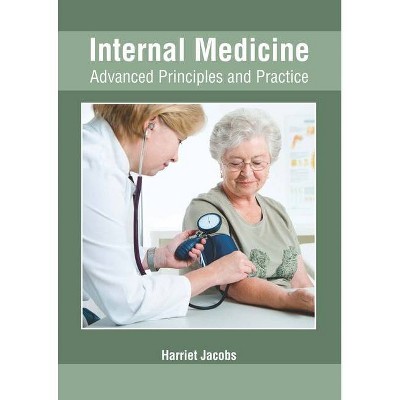
![Adventures of Sonic the Hedgehog, Vol. 1 [Collector's Edition] [2 Discs] [DVD]](https://pisces.bbystatic.com/image2/BestBuy_US/images/products/5085/5085498_so.jpg)



